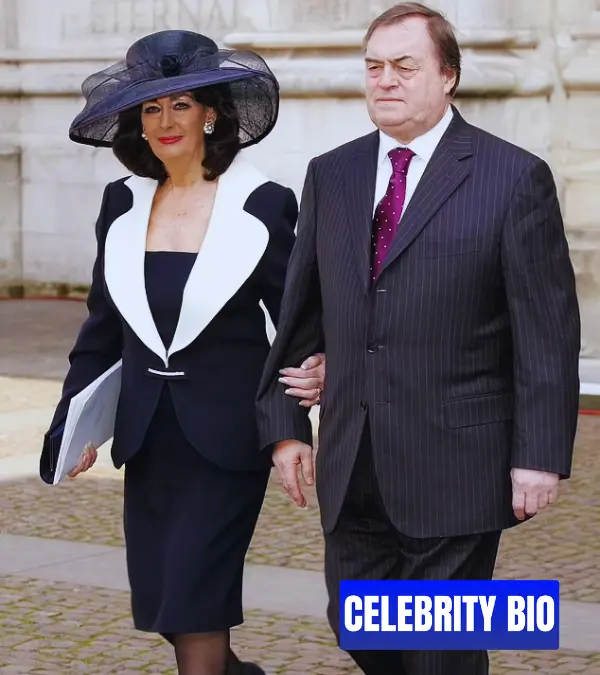In the vast tapestry of British political history, names often rise and fall with the tides of public opinion. Yet among those who never sought the spotlight lies a woman whose resilience and dignity have left a quiet but powerful imprint: Pauline Prescott. Known predominantly as the wife of John Prescott, former Deputy Prime Minister of the United Kingdom, Pauline’s story is one that has long remained in the background. But behind that composed exterior is a life rich with strength, sacrifice, and a kind of fortitude that deserves attention in its own right.
In this article, we delve into the layered narrative of Lady Pauline Prescott — a woman who never held public office, never gave fiery speeches, and never asked for attention, yet who embodies resilience, discretion, and a quiet grace that has become increasingly rare. From a humble beginning to standing firm during moments of public scandal, her life speaks to a generation of women who endure with quiet courage.
Early Life and Personal Background
Pauline Tilston was born in the north of England during the post-war years, in a modest home rooted in working-class values. She grew up in an era defined by austerity and community, where privacy was not just valued but essential. Raised in a family that prized hard work and humility, Pauline developed the core traits that would later define her adult life: quiet determination, loyalty, and emotional strength.
As a young woman, Pauline took up work as a hairdresser — a profession that gave her a window into people’s stories without revealing her own. She was known by her peers as gracious but guarded, always offering support to others but rarely allowing herself to become the centre of attention. It was in this world of early adulthood that she met a young, ambitious man named John Prescott.
Marriage to John Prescott: Life in the Political Shadow
Pauline married John Prescott in 1961, long before he became a dominant figure in British politics. Their marriage would span the decades — through the rise of New Labour, the heights of governmental power, and the inevitable pressures that came with political life.
From the beginning, Pauline seemed to understand the unspoken rules of being a political spouse. She did not seek the limelight, nor did she involve herself in policy or public discourse. Instead, she became a pillar behind the scenes — managing the home, maintaining emotional stability, and offering her husband unwavering support, even when his political life was all-consuming.
Being married to a high-profile political figure came with its sacrifices. Privacy became a rare luxury. Family life was punctuated by parliamentary sessions, political campaigns, and public scrutiny. Yet Pauline remained composed, rarely photographed, and even more rarely quoted. Her dignity, often mistaken for passivity, was in fact a deliberate choice — a form of strength forged by the need to protect herself and her family.
Public Scandals and Personal Dignity

In 2006, a media storm erupted when it was revealed that John Prescott had engaged in an extramarital affair with his diary secretary. The scandal sent shockwaves through the political world and became front-page fodder for weeks. But as cameras turned toward Pauline, anticipating outrage or sensationalism, she responded not with fury, but with silence.
Her decision not to speak publicly about the betrayal was both criticised and admired. In a world increasingly obsessed with emotional transparency and reality-TV-like drama, Pauline’s silence stood out as an act of profound personal power. It was a statement: she would not be used as a tabloid trophy, nor would she allow the press to dictate her emotional response.
Many saw this choice as old-fashioned. But to those who understood the quiet discipline required to maintain dignity in the face of national humiliation, Pauline’s response was nothing short of heroic. She neither defended her husband nor publicly condemned him. Instead, she maintained the one thing that no one could take from her: control over her own narrative.
Private Life, Resilience and Independence
Long before and long after the scandal, Pauline Prescott built a life grounded in her own interests and values. She did not chase the glitz of political galas or socialite circles. Instead, she found joy in the ordinary: gardening, reading, spending time with close friends, and doting on her children and grandchildren.
Her refusal to engage with the media post-scandal was not a retreat, but a return — a return to the kind of private life she had always preferred. She had never craved public validation. Her world was defined not by headlines, but by the quiet, enduring rhythms of family and personal peace.
There are accounts of Pauline’s involvement in low-key charitable work and community initiatives, always away from the cameras. She embodied a model of womanhood seldom championed in modern media: resilient without bitterness, graceful without theatrics, and strong without needing to perform that strength.
Media Portrayal vs. True Character
Tabloids often portray women like Pauline Prescott as relics — symbols of a bygone era when wives were expected to “stand by their man.” But this reductionist view does a disservice to the complexity of her character.
Pauline’s refusal to play into the media’s narrative was, in many ways, an act of rebellion. While others might have penned memoirs, given interviews, or gone on talk shows to tell their side of the story, she chose none of those paths. Instead, she stayed true to her values, offering no further fuel to the public spectacle. It was a decision rooted in self-respect.
The press may have underestimated her, but the public did not. Letters of support flooded in during the 2006 scandal. Many saw in Pauline a reflection of their own experiences — of betrayal, of endurance, of choosing family over revenge. Her strength lay not in what she said, but in what she refused to say.
Her Legacy as a Public Figure in the Background
Pauline Prescott’s legacy is not one of political achievement or public accolades. It is subtler, but no less significant. She represents a generation of women who carried emotional burdens silently, who held families together behind closed doors, and who modelled grace in the face of adversity.
While she may not appear in the history books alongside Britain’s most influential figures, Pauline’s influence is undeniable. Behind every powerful man is often a woman holding the centre, offering balance, and maintaining humanity amid chaos. She exemplified this role with rare composure.
Women like Pauline Prescott do not demand recognition — and perhaps that is why they deserve it all the more. Her quiet leadership, emotional intelligence, and unwavering dignity are traits that modern public life could use in greater supply.
What We Can Learn from Pauline Prescott
In an age defined by oversharing and constant visibility, Pauline Prescott teaches us the power of restraint. She reminds us that not all strength is loud, and not all dignity comes from speaking out.
Her choice to remain with her husband after betrayal, to shield her private life from public commentary, and to continue living on her own terms speaks volumes about her inner world. She reminds us that forgiveness is not weakness, and that silence can be a form of wisdom, not cowardice.
Public figures — and even ordinary people — might look to her example as a blueprint for navigating personal crises with self-possession. Her story encourages us to question our own responses to betrayal, shame, and public judgement. Can we be strong without shouting? Can we lead without needing the applause?
Conclusion
Pauline Prescott is far more than “the wife of John Prescott.” She is a woman who weathered storms with quiet courage and who redefined what it means to survive in the public eye. Her story is not just about one scandal or one marriage — it is about enduring values in a world that too often forgets them.
In the background of one of Britain’s most chaotic political eras stood a woman of unshakeable composure. While others crumbled under pressure or lashed out, Pauline Prescott chose a different path: she chose dignity.
And perhaps the final question to ask is this: In a world where everyone is shouting to be heard, could the greatest power lie in staying silent?
Frequently Asked Questions (FAQs)
Who is Pauline Prescott?
Pauline Prescott is the wife of former UK Deputy Prime Minister John Prescott. She is known for her quiet resilience and dignified silence during periods of political and personal turmoil.
Is Pauline Prescott still married to John Prescott?
Yes, despite public revelations of an affair in 2006, Pauline and John Prescott have remained married.
Did Pauline Prescott ever speak publicly about the scandal?
No, she has consistently chosen to remain silent on the matter, which many interpret as a reflection of strength and personal integrity.
What is Pauline Prescott known for?
She is widely respected for her composed response during her husband’s political scandal and for maintaining her privacy despite media attention.
Where does Pauline Prescott live now?
Pauline is believed to live a private life in the UK, focusing on family and personal peace, away from the public eye.
What does Pauline Prescott do today?
She remains largely out of the public domain, dedicating her time to personal pursuits and family.
How did the public react to Pauline Prescott during the scandal?
Many members of the public expressed sympathy and admiration for her dignified response, viewing her as a symbol of quiet strength.

